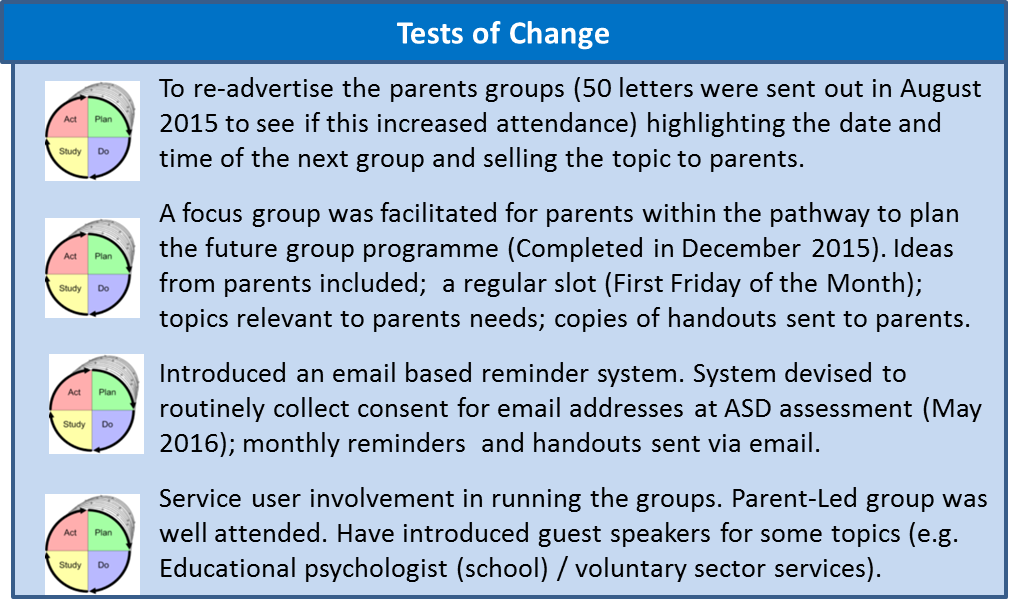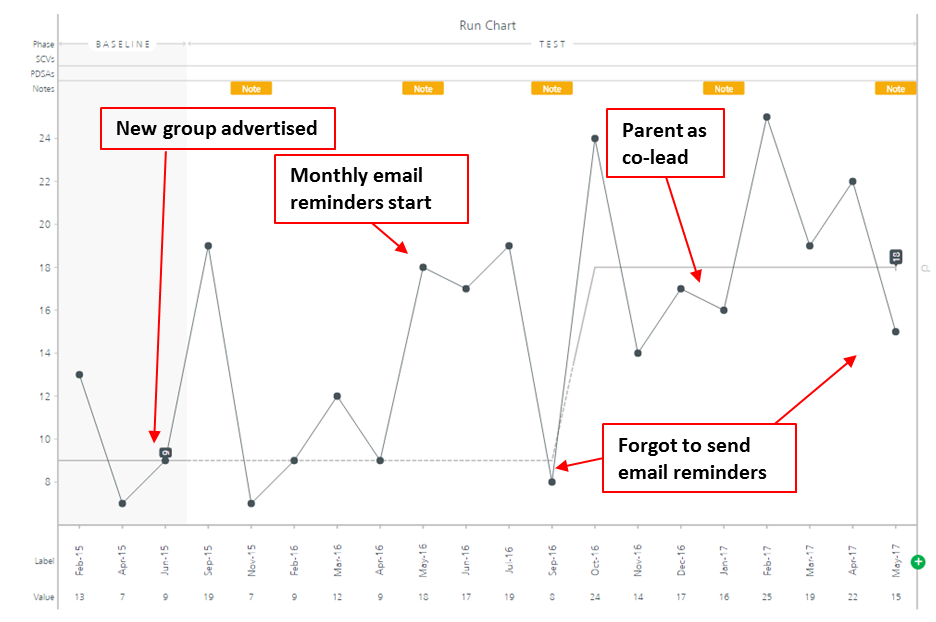
Improving interventions for parents of children and young people with Autism Spectrum Disorders (ASD) in CAMHS
30th June 2017
Laura Roughan, Psychologist, in our City and Hackney Child & Adolescent Mental Health Service, writes about her team’s QI project aimed at Improving interventions for parents of children and young people with Autism Spectrum Disorders (ASD) in CAMHS
Background
In 2015, City and Hackney Child and Adolescent Mental Health Service (CAMHS) devised a pathway model for assessment and treatment. Resources within pathways were limited and the autism pathway comprised of a Child and Adolescent Psychiatrist (5 sessions) and a clinical psychologist (10 sessions) with some additional sessions from clinicians in different pathways for Autism Spectrum Disorder (ASD) assessments. The autism pathway has a large caseload with young people and their family’s presenting to CAMHS for specialist assessment and treatment. There was a need to develop innovative interventions to meet the needs of a large client group, with limited clinician’s time.
Research and guidance in working with children and young people with ASD highlights the importance of timely psycho-education about ASD for parents of recently diagnosed children. Groups such as Early Bird are run in the borough, but have long waiting lists which meant parents were waiting for the initial support following diagnosis. As part of our pathway offer we devised a 2 session psycho-education group for parents. The service user feedback from these groups suggested that meeting other parents of children and young people with ASD was very helpful. However, many parents reported they needed further advice and support to manage their child with autism and wanted on-going access to professional support from a range of professionals (e.g. Occupational Therapy, Speech and Language Therapy, psychology).
In collaboration with colleagues in the multi-agency service (e.g. OT and SLT), we started to develop groups, covering different topics relevant to ASD (e.g. managing challenging behaviour, developing social skills, how to talk about ASD) to see whether this offered parents access to an intervention that helped them feel more able to cope with their child’s autism. Initially there was positive feedback, but attendance dropped and referrals into CAMHS for ASD specific concerns increased. Without a regular offer, parents still wanted individual support which was a challenge with high numbers of families and low staff resource. There was a need for a system to ensure parents had knowledge of the groups, were able to access the groups as well as feel that when they did, the group was relevant and helpful to parents.
We wanted to make the groups more relevant, accessible and effective for families. The Quality Improvement (QI) methodology was implemented to support this process.
Design and Method
The Aim of the QI Project was therefore to develop an ASD parent group intervention that is relevant, accessible and effective for families as measured by:
1) An increase in number of parents attending groups and ensure 50% of parents attend at least one group per a year
2) An increase parent’s perceived ability to manage their child’s difficulties (Supporting parents so they do not need individual work within CAMHS)
3) Parent reported satisfaction in the intervention
The main measure for the project was the number of parents attending each group over a specific period of time (from February 2015- May 2017). In addition, the project aimed to ensure at least 50% of parents of children receiving an ASD diagnosis from the autism assessment clinic had access the psycho-education groups. A service-user questionnaire was devised and given to parents at the end of each group asking parents for feedback about the group (e.g. “How enjoyable did you find the group?”; “How much more confident do you feel in managing your child’s autism?”).
Throughout the project a number of Plan Do Study Act (PDSA) cycles and change ideas (e.g. to run a focus group with parents within the ASD; email reminder system) were completed, monitored and evaluated in the QI framework to assess the impact change ideas had on parent attendance, satisfaction and confidence in parenting a child with ASD.
Results
A total of 20 groups have been run since the start of the QI project in February 2015 and number of parents attending each group was collected. In total out of 295 attendees, we received feedback from 190 questionnaires were completed out of a total of 295 attendees (a response rate of 64.4% of parents providing feedback).
Quantitative and qualitative responses from the service user questionnaire were analysed. Overall 91% of the attendees were either “Quite Satisfied” or “Extremely Satisfied” with the groups. 82% of parents reported increases in their own confidence in managing their child with ASD following attendance at a group.
Learning
The QI approach allowed us to systematically develop efficient systems and cost-effective ways run interventions within an ASD pathway. The monthly parent groups have been successful in increasing parent’s perceived ability to cope with their child with ASD. From a service perspective it has been a helpful way of managing a large number of parents of children with ASD in the context of limited resources. The monthly groups are providing on-going support where otherwise parents might require costly individual intervention in specialist CAMHS. Using systematic research methodology (QI) is a helpful way to monitor changes and improve clinical practice.
Click here to view the project team’s poster showcasing their work
Most Read Stories
-
Why is Quality Control important?
18th July 2018

-
An Illustrated Guide to Quality Improvement
20th May 2019

-
2016 QI Conference Poster Presentations
22nd March 2016
-
Recognising Racism: Using QI to Help Take Action
21st January 2021

-
Using data enabled us to understand our problem
31st March 2023

-
QI Essentials: What does a Chief Quality Officer do?
18th March 2019


Follow QI on social media
To keep up to date on the latest concerning QI at ELFT, follow us on our socials.




